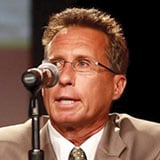Berkshire Hathaway (BRK.B) is swamped with cash -- rising toward $100 billion at last count. How to drain the swamp flummoxes Berkshire Chairman and CEO Warren Buffett. Allocating the cash has become problematic, notes Steve Mauzy, editor of Wyatt Research’s Daily Profit.
Get Trading Insights, MoneyShow’s free trading newsletter »
Size is a contributor. Berkshire sports a $436 billion market cap. Investments must sop up the cash in billion-dollar increments.
Berkshire accumulated 129.4 million Apple (AAPL) shares through 2016 and early 2017. Apple can readily absorb a $13 billion investment and no one’s the wiser. Few other companies can say the same.
The problem -- as welcomed as the problem might be -- will get worse. Nearly all of Berkshire’s publicly traded investments pay dividends. Of the dividend payers, most are dividend growers.
Berkshire will receive $326 million in annual dividends from Apple, $280 million from Wells Fargo (WFC), $592 million from Coca-Cola (KO). Berkshire’s largest holding, Kraft Heinz (KHC), will pay it a whopping $807 million in annual dividends.
The infusion is $2 billion from those four stocks alone. The amounts will only rise. All four are dividend-growth stocks.
Privately, Buffett may luxuriate in his problem. (I would.) But it’s still a problem. If the only options are to chase what everyone else is chasing, the risk of overpaying and under-performing rises.
I see one solution to the vexing $100-billion problem: dividends. I’ve long argued for Berkshire to pay dividends and now its time.
Berkshire should pay a dividend, special or regular, like the mere-mortal companies whose shares it owns. Not all $100 billion should be paid, mind you, but $25 billion is a good start.
No one suffers under the dividend scenario. Cash will always be available in case a mega-deal pops up to Buffett like a jack-in-the-box. Berkshire will always have access to cheap capital with Buffett at the helm.
Investors retain their proportional ownership, but now they have the cash to buy that $300 million market cap growth stock Berkshire couldn’t possibly buy.
All companies are valued based on the present value of future cash flows. The future has finally arrived. Berkshire Hathaway has no choice but to pay dividends.











